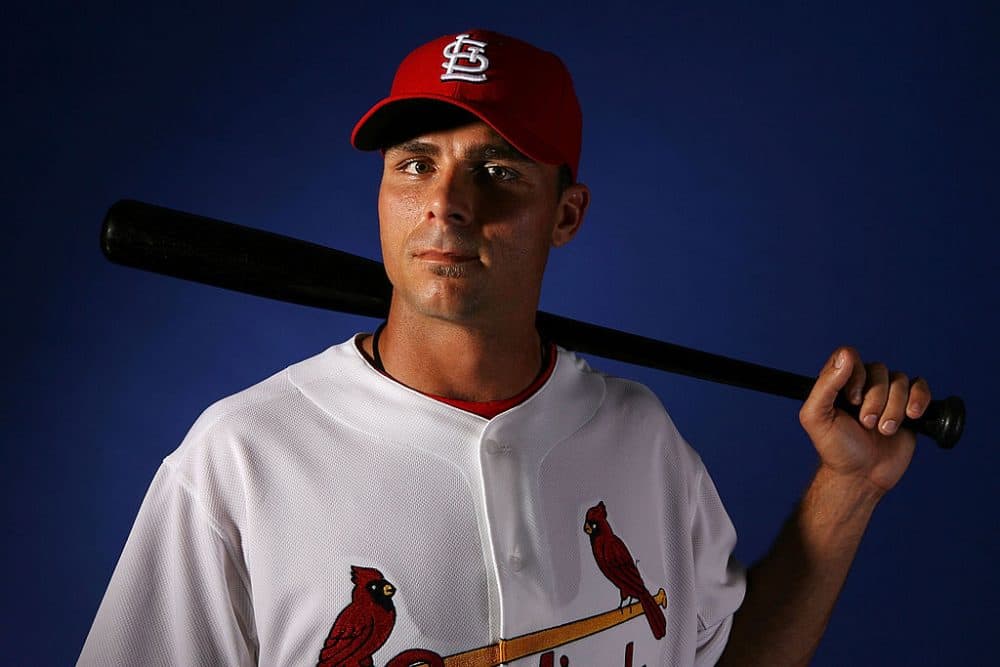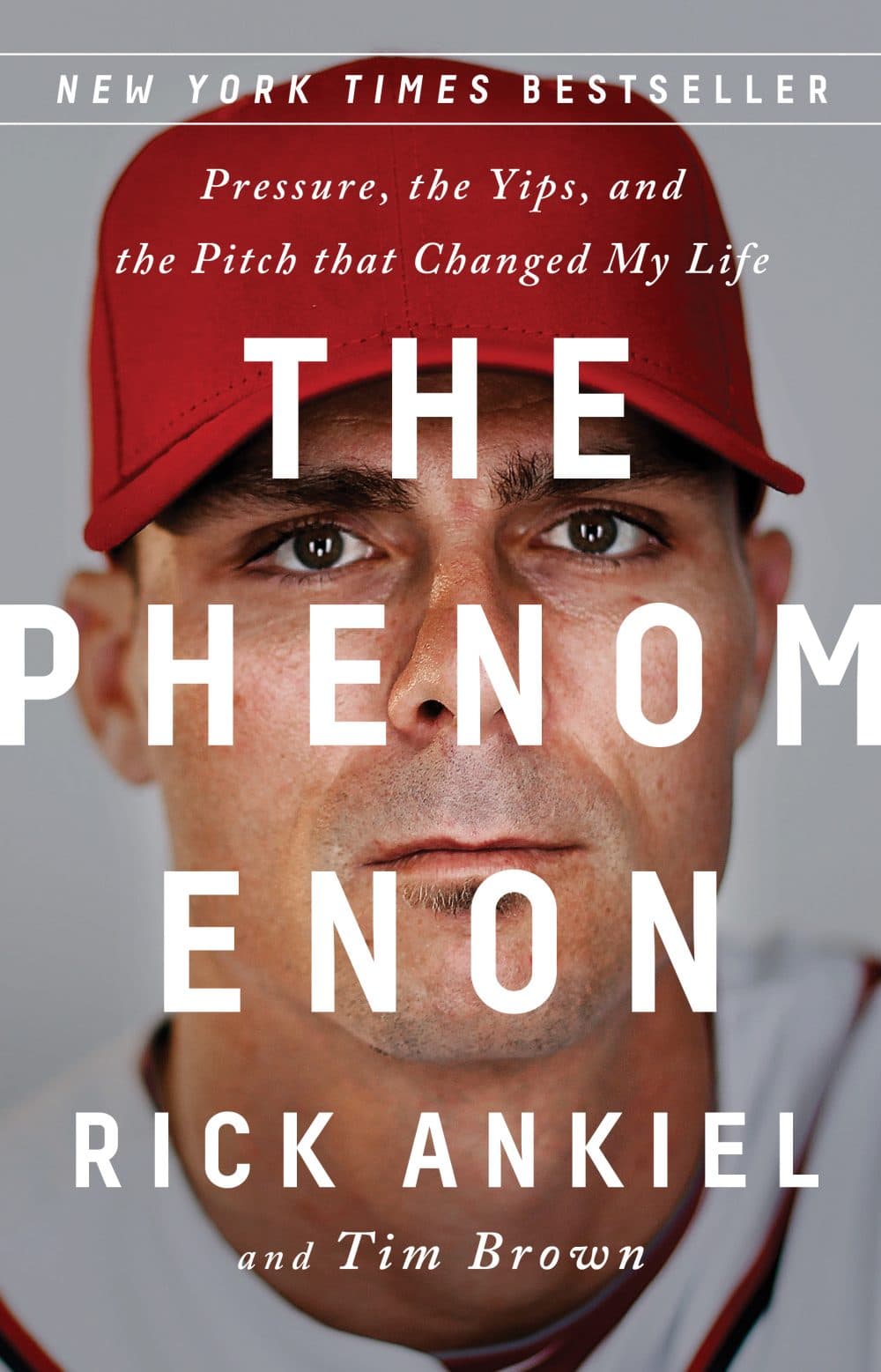Advertisement
Former MLB Hurler Remembers 5 Pitches That Derailed His Career
Resume
Rick Ankiel is not a doctor, but if you ask him what happened to his once-promising Major League pitching career, he’ll offer a diagnosis.
"'The Thing,' 'The Yips,' 'The Monster,' whatever you want to name it," Ankiel says. "You lose your ability to do something that you’ve done your whole life without the explanation of why."
Overcoming Hardship With Baseball
Twenty years ago, some were calling Ankiel the next Sandy Koufax, the next Bob Gibson, a once-in-a-generation pitcher. What he was at the time was a talented 17 year old who had used baseball to escape from a difficult home.
"I grew up in Fort Pierce, Florida," Ankiel says. "Family life at times was good and at times was bad. My father was an alcoholic and two-bit criminal, abused drugs. And there were times where he would disappear for a few days. You know, he’d start drinking and then he was gone. But when he would come home and you heard the car door slam, you knew it was time to make sure you stayed out of the way. And, you know, it makes it hard."
Ankiel’s father beat his mother and sometimes turned his wrath on his children. Throughout the hard times, Ankiel played sports — lots of them — with his brother and neighborhood friends. And sometimes even with his father, whose verbal abuse undercut his son’s confidence for a time.
The young Ankiel loved baseball. And it came very easily to him. In high school, he had a 94 mph fastball. He struck out 162 batters in 74 innings his senior year and posted an ERA of 0.47. He had found a way to feel good about himself.
"Oh, it’s the best feeling in the world," Ankiel says. "I mean, you’re out there and you control the entire game. You know, in those moments, you feel like it’s your destiny and you were meant to be there and put on this earth for that reason."
Early Success
After high school, Ankiel entered the 1997 Major League draft and was chosen in the second round by the St. Louis Cardinals. He rose quickly through the minors. On Aug. 23, 1999, he made his first Major League start. He was 20.
"I remember the first hitter I faced, which was Rondell White," he says. "And I struck him out. And after that first strikeout, it was another one of those reminders of like, 'I’m supposed to be here, and this is how it was supposed to happen.'"
Ankiel went 11-7 in 2000. The Cardinals made the playoffs and faced Atlanta in the first round. Manager Tony La Russa named Ankiel as the Game 1 starter. Ankiel was confident his success in the regular season would carry over.
"Yeah, in a lot of ways, I thought it was going to go better," he says. "You know, I was more worried about getting a base hit off of Greg Maddux than I was pitching. Because I thought pitching would just take care of itself."
It always had for Rick Ankiel. Why wouldn’t it in his postseason debut?
"Everything was great," he says. "I remember walking from the bullpen to the dugout. We were the home team. And I was ready. I felt like this was my time to show the world who I was."
'The Thing' Took Over
The Cardinals jumped out to an early lead, and Ankiel cruised through the first two innings. He took the mound in the third inning with a 6-0 lead. Then "The Thing" Ankiel talked about came calling.
"And I threw a fastball in that cut," he says. "It really wasn’t that bad of a pitch, but the catcher missed it, and I thought to myself, 'Man, I just threw a wild pitch on national TV.'"
Having established a shaky foothold in Rick Ankiel’s psyche, "The Thing" took over. He threw one wild pitch after another.
"I’m trying to use all my keys that would get me back on track: keep your weight back, lead with your hip, keep your elbow up. All these things," he says. "And everything that had always worked for me was not working in that moment.
"So now I’m launching stuff off the back screen, against the backstop. And it just continually got worse.
"And I was so young, I didn’t even understand what was going on. You know, it just seems like things start to speed up so fast. The craziest thing is that I knew what I wanted to do, but my body and brain would not allow me to do it."
Ankiel threw five wild pitches that inning. The last Major League pitcher to throw five wild pitches in one inning was Bert Cunningham. That happened on Sept. 15 … 1890. Ankiel was given the hook in the third inning with St. Louis leading, 6-2.
The Cardinals hung on to win the game. Ankiel’s teammates did their best to say the things that would help him get his head together for his next postseason start.
"A lot of just, 'Hey, stay strong.' But I think it’s one of those things where they didn’t know what to say," he says. "And, me being as young as I was, I just laughed it off and I told them and told the media afterwards, 'Hey this is a mechanical glitch. It’ll never happen again. I’ll be fine.'"
"I’d wake up with my heart beating 100 miles an hour. Sweating. That anxiety would carry over into the next day, and now trying to play catch was near impossible."
Rick Ankiel
But he wasn’t. Nine days after his disastrous performance against the Braves, he took the mound to face the New York Mets in the National League Championship Series. He threw two more wild pitches, gave up two runs and was yanked in the first inning.
"That’s when it started to settle in, 'Hey, something’s not quite right here,'" he says.
Yes, but what wasn’t right? Ankiel didn’t know. The Mets eliminated the Cardinals, and Ankiel looked for the answer in the off-season. He met regularly with a sports psychologist. He threw balls at a wall behind his house for several hours each day. He tried to imitate the mechanics of other pitchers. Then he began having nightmares in which he was unable to throw a single strike.
"And I’d wake up with my heart beating 100 miles an hour. Sweating," he says. "That anxiety would carry over into the next day, and now trying to play catch was near impossible."
Ankiel’s anxiety carried over to the beginning of the 2001 season, when he faced the Diamondbacks and one of the most feared pitchers in the game.
"And I remember that day of that first start," he says. "And I was gonna start against Randy Johnson. And that day of the game, once I got to the stadium, the anxiety and the nerves that I felt were just ... were overwhelming."
Ankiel went to his mentor, Cardinals ace Darryl Kile, and asked him a question.
"'Hey, do you think you can go find some alcohol and put it in a water bottle?' I was, like, 'I have no chance to go out there and be successful. I don’t know what else to do,'" Ankiel recalls. "And he went and got it, and I started sipping on that water bottle, and it worked. And I remember during the third inning feeling like — I could feel the anxiety trying to overcome the alcohol. And I just kept sipping on that water bottle and I did beat Randy Johnson that game.
"And then the next game, I tried it again. The anxiety overcame the alcohol, and things just started to go south again, and I was throwing balls all over again."
Ankiel lost his second start of the season and was sent to the minors. The next three years brought more wild pitches, more anxiety, elbow surgery and the sudden death of his close friend, Darryl Kile. Ankiel says he battled the best he could. But he finally admitted to himself that in those few minutes on the mound in the 2000 postseason, his psyche had been permanently damaged. In March 2005, he decided to retire.
From The Mound To The Grass
"I went into Tony La Russa’s office and said, 'Hey, you know, I can’t do this anymore,'" Ankiel says. "And I go home. And now I’m at home on the couch, and my agent, Scott Boras, calls me, and he says to me, 'Are you ready to go play?' And I said, 'Go play what?' He said, 'Baseball.' I’m like, 'What are you talking about? Is nobody listening to me? I just quit. I’m done. I retired.' He’s like, 'No. As an outfielder. Would you want to try to be an outfielder?' I remember saying to him, 'You know what? I gotta think about this.' So I hang up. And finally I let myself visualize making it back to the big leagues as an outfielder and hitting a home run. And once I felt what that felt like in my mind, I picked up the phone, called Scott Boras and said, 'Hey, I’m in 100 percent. Let’s do this.'"
"Doing this" meant another stint in the Cardinals’ minor league system, this time as an everyday player. Knee surgery led to a couple more lost seasons. But he stuck with it. On Aug. 9, 2007, Ankiel made his Major League debut as an outfielder and full-time hitter.
Over the next seven seasons, Ankiel held down a Major League job and excelled as an outfielder.
Ankiel says it was easier for him to throw a ball to the plate from 300 feet away than it had been to throw strikes from the mound. His arm was no longer under control of "The Beast," "The Monster" or "The Thing."

"Driving to the park knowing that I’m going to be an outfielder today and I don’t have to worry about throwing strikes, it was fun," Ankiel says. "I felt like this giant weight had been lifted off of my shoulders and I could breathe again."
Rick Ankiel batted .228 as an everyday player with six different teams. He retired from baseball after the 2013 season. He seems happy now. Maybe it’s because marriage and fatherhood have given him the opportunity to get right what was so wrong when he was a kid. Or maybe it’s because, despite his inability to know all the reasons for the implosion of his pitching career, he can now characterize it this way:
"As awesome," he says. "I mean, I got to live two dreams. And there’s not a lot of people who can say that. It’s hard enough to make it to the big leagues once. And now I’m the guy who gets to say that I made it twice. And I’m proud of that."
Learn more about Rick Ankiel's story in his new book, "The Phenomenon: Pressure, the Yips, and the Pitch that Changed My Life."
This segment aired on May 20, 2017.
